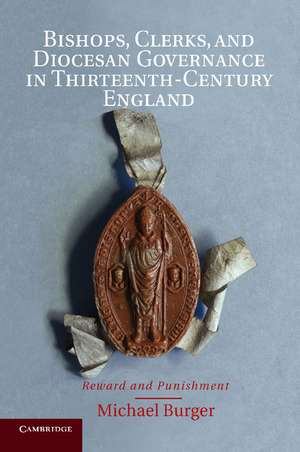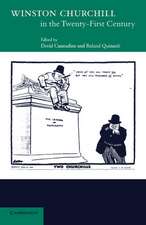Bishops, Clerks, and Diocesan Governance in Thirteenth-Century England: Reward and Punishment
Autor Michael Burgeren Limba Engleză Paperback – 10 sep 2014
| Toate formatele și edițiile | Preț | Express |
|---|---|---|
| Paperback (1) | 364.46 lei 6-8 săpt. | |
| Cambridge University Press – 10 sep 2014 | 364.46 lei 6-8 săpt. | |
| Hardback (1) | 697.62 lei 6-8 săpt. | |
| Cambridge University Press – 21 oct 2012 | 697.62 lei 6-8 săpt. |
Preț: 364.46 lei
Nou
Puncte Express: 547
Preț estimativ în valută:
69.76€ • 71.89$ • 58.89£
69.76€ • 71.89$ • 58.89£
Carte tipărită la comandă
Livrare economică 03-17 martie
Preluare comenzi: 021 569.72.76
Specificații
ISBN-13: 9781107417427
ISBN-10: 1107417422
Pagini: 332
Dimensiuni: 153 x 230 x 23 mm
Greutate: 0.49 kg
Editura: Cambridge University Press
Colecția Cambridge University Press
Locul publicării:New York, United States
ISBN-10: 1107417422
Pagini: 332
Dimensiuni: 153 x 230 x 23 mm
Greutate: 0.49 kg
Editura: Cambridge University Press
Colecția Cambridge University Press
Locul publicării:New York, United States
Cuprins
Part I. The Problem: 1. Introduction; 2. Dangers of service; Part II. Rewards and Punishments: 3. Benefice for service and for benefit; 4. Security of tenure in benefices; 5. Pensions; 6. Other rewards; 7. Punishment; Part III. Consequences: 8. Patronage hunger; 9. Continuity and discontinuity in administration; 10. Affection and devotion; 11. Conclusions: culture and context.
Recenzii
'This book will be essential reading for anyone interested in the workings of diocesan administration in thirteenth-century England. In particular, Burger sheds new light on the complex relationship between the bishop and his bureaucrats. We learn why medieval bishops used rewards, particularly the granting of benefices, far more than punishments in dealing with their clerical subordinates, and [he] draws valuable comparisons between developments in episcopal and royal administration. Above all, this book explains how the rise of an administrative church impacted the power of bishops.' Adam Davis, Denison University and author of The Holy Bureaucrat: Eudes Rigaud and Religious Reform in Thirteenth-Century Normandy
'Burger's study provides a richly detailed examination of episcopal governance, revealing essential aspects of bishops' rule. He reveals the dark side of thirteenth-century diocesan administration concealed by previous institutional histories - the hunger for patronage, the inconsistencies of service, and the fickle fawning of clerics attempting to advance in the hierarchy. Scholars of medieval rule and its practice, both within and outside the church, will find much of interest in [this] book.' Robert F. Berkhofer, III, Western Michigan University
''Tenure', or a permanent employment contract, remains the aspiration of most employees. What role did such aspirations play in the medieval Church, and how did churchmen resolve the tensions between spiritual service and monetary reward? Could such rewards be diminished or even revoked if a churchman broke with his original patron? These are questions of great significance, yet they have never before been approached with the forensic mastery that Michael Burger brings to his task. [His] study of the benefice fills a major gap in our understanding of patronage. It tells many new and remarkable stories of masters and servants. Of the good, the bad, and the professionally litigious. It deserves to be widely read.' Nicholas Vincent, University of East Anglia
'… will be of interest especially to those readers already acquainted with medieval ecclesiastical administration, but this volume also offers much to those interested in medieval networks of patronage, in a range of relationships between superiors and subordinates, and in the economics and politics of medieval religious life. Though Burger's volume requires commitment on the part of the reader, it repays careful reading with a wealth of detail about one of the most important sets of relationships in the medieval church.' J. Patrick Hornbeck, II, Marginalia Review of Books
'A close investigation of how bishops rewarded, or disciplined and punished their administrative subordinates. Much of the book is prosopographical and examines the granting of benefices, security of tenure, pensions and other rewards (such as gifts, fees and property) before turning to punishments - bonds, excommunication, oaths, prison. Finally, the consequences are examined: patronage hunger, continuity of service, affection and devotion. The author draws on evidence country-wide, making particularly heavy use of the diocesan archives of Lincoln and York.' Northern History
'… this is a valuable and useful discussion of the career relations between English bishops and their dependent administrators. Its evidence may derive from the thirteenth century; but its analysis applies across the later medieval period.' The Catholic Historical Review
'Michael Burger's lucid and often entertaining book takes up the question of how English Bishops wielded power.' Katherine L. French, Sixteenth Century Journal
'Burger's study provides a richly detailed examination of episcopal governance, revealing essential aspects of bishops' rule. He reveals the dark side of thirteenth-century diocesan administration concealed by previous institutional histories - the hunger for patronage, the inconsistencies of service, and the fickle fawning of clerics attempting to advance in the hierarchy. Scholars of medieval rule and its practice, both within and outside the church, will find much of interest in [this] book.' Robert F. Berkhofer, III, Western Michigan University
''Tenure', or a permanent employment contract, remains the aspiration of most employees. What role did such aspirations play in the medieval Church, and how did churchmen resolve the tensions between spiritual service and monetary reward? Could such rewards be diminished or even revoked if a churchman broke with his original patron? These are questions of great significance, yet they have never before been approached with the forensic mastery that Michael Burger brings to his task. [His] study of the benefice fills a major gap in our understanding of patronage. It tells many new and remarkable stories of masters and servants. Of the good, the bad, and the professionally litigious. It deserves to be widely read.' Nicholas Vincent, University of East Anglia
'… will be of interest especially to those readers already acquainted with medieval ecclesiastical administration, but this volume also offers much to those interested in medieval networks of patronage, in a range of relationships between superiors and subordinates, and in the economics and politics of medieval religious life. Though Burger's volume requires commitment on the part of the reader, it repays careful reading with a wealth of detail about one of the most important sets of relationships in the medieval church.' J. Patrick Hornbeck, II, Marginalia Review of Books
'A close investigation of how bishops rewarded, or disciplined and punished their administrative subordinates. Much of the book is prosopographical and examines the granting of benefices, security of tenure, pensions and other rewards (such as gifts, fees and property) before turning to punishments - bonds, excommunication, oaths, prison. Finally, the consequences are examined: patronage hunger, continuity of service, affection and devotion. The author draws on evidence country-wide, making particularly heavy use of the diocesan archives of Lincoln and York.' Northern History
'… this is a valuable and useful discussion of the career relations between English bishops and their dependent administrators. Its evidence may derive from the thirteenth century; but its analysis applies across the later medieval period.' The Catholic Historical Review
'Michael Burger's lucid and often entertaining book takes up the question of how English Bishops wielded power.' Katherine L. French, Sixteenth Century Journal
Notă biografică
Descriere
This book investigates how bishops deployed reward and punishment to control their administrative subordinates in thirteenth-century England.










